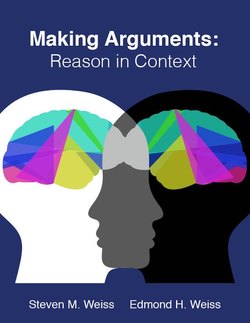Читать книгу Making Arguments: Reason in Context - Edmond H. Weiss - Страница 8
На сайте Литреса книга снята с продажи.
How do we study argument?
ОглавлениеLike many other fields, argument is studied by attention to its principles, which have developed since the time when the ancient Greek Sophists began teaching clients how to win cases in court. Argument is one of the oldest of all intellectual disciplines and involves a number of related skills, including logic, linguistics, grammar, composition, critical thinking, and public speaking. For at least 2500 years, those skilled in argument have been sought after as leaders and professionals.
Because the field of argumentation has such a long history, it has a tremendously rich tradition, including a vocabulary of terms, concepts, and definitions that comprehensively describe its scope. To study it not only means mastery of these concepts, and how they operate, but also their application in debates, discussion, and argumentative writing.
The word argument shows up in many forms, both colloquial and formal. Here are some examples:
•In logic, formal deductive reasoning, where premises lead to a conclusion.
•The universe of discourse characterized by reason-giving (the notion explored in this book)
•The social communicative act entered into by parties in dispute; their dispute may be political, legal, or otherwise. More particularly, their dispute can be of an interpersonal nature, as in “having an argument.”
•An extended and justified case for some belief or action; it develops a thesis and may provide a comprehensive set of sub-arguments and sub-claims. If a historian offers a book-length argument about the causes of WWII, he or she provides many sub-arguments along the path to the conclusion.
•The study of argumentation. In Britain, the words argumentation and argument are synonymous in describing the arguments an advocate makes.
To argue can mean to make an argument or it can just mean, colloquially, to be disagreeable. The famous “Monty Python Argument Clinic” sketch focuses on the question of whether just being disagreeable is tantamount to having an argument.
Man: Well, an argument's not the same as contradiction.
Mr. Vibrating: It can be.
Man: No, it can't. An argument is a connected series of statements intended to establish a definite proposition.
Mr. Vibrating: No it isn't.
Taking all these definitions and traditions into consideration, we propose that an argument is the process in which one gives good reasons for a particular judge to accept a disputed claim or proposal. This definition includes all the methods associated traditionally with both models (Lee’s and Bailey’s approaches, respectively). Most important though, under this definition, those traditional approaches are shaped and tempered by a constant mindfulness—awareness and anticipation—of the importance of judgment.
Studying argument, then, converts an everyday activity into a formalized study. In that sense, it is like any study that transforms what people acquire naturally into the realm of an artistic enterprise. And just as a naturally good musician benefits from music instruction, often more than someone with no musical ability, so does studying argumentation either enhance the effectiveness of those that already have ability, or, alternately, build that ability from scratch in others.
Not surprisingly, students of argumentation come to their study with vastly different expectations. Some feel that they already argue well and often, so that the study of argumentation should come easily to them. Other students, perhaps because of shyness or introversion, fear the prospect of publicly defending arguments with evidence, organization, and reasoning. Whether or not students feel “comfortable” with argumentation, however, seems to have little to do with their ability to master it. That is, being naturally argumentative or comfortable in public debates seems to have little effect on the student’s success in studying or mastering the subject.
About the only student who cannot learn to argue is the one we call the “opinion monger”; this student is given to asserting that everyone’s entitled to his or her opinion, that one opinion is as “valid” as another, and so forth. Of course, such students are indeed entitled to that opinion, but, so long as they hold it, they are not likely to learn much or have much influence in their communities. (And if they cannot argue their point, they’ll never convince us.)
What is important is that nearly every student, regardless of temperament, can succeed at, and learn from, this subject matter. And, what is even more important, the skills acquired in the study of argumentation will serve the student well in nearly every academic course —and in most professions as well.
